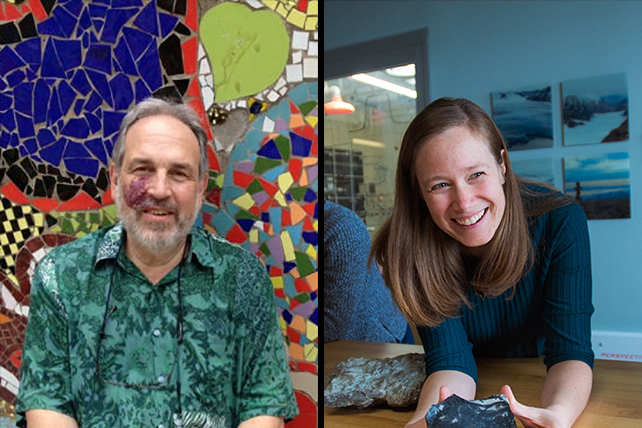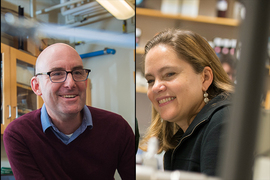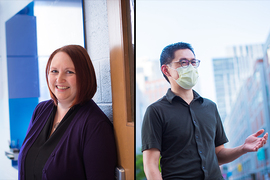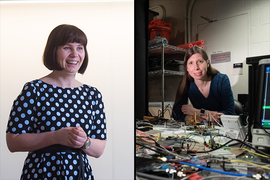Professors Kristin Bergmann and Larry Susskind listen fully and compassionately to students. Both are deeply invested in crafting inclusive environments — and many students attest to how effective they are in this endeavor. For their thoughtful advising and wholehearted support of students, Bergmann and Susskind have been honored as “Committed to Caring.”
Kristin Bergmann: Cultural evolution
Bergmann holds the D. Reid (1941) and Barbara J. Weedon Career Development chair in the Department of Earth, Atmospheric and Planetary Sciences. A graduate of Carleton College, Bergmann later taught middle school Earth and life sciences before pursuing her PhD at Caltech. After graduate school, Bergmann joined the Harvard Society of Fellows as a junior fellow.
The Bergmann lab reconstructs environmental change through studying primarily marine carbonate sedimentary rocks from Oman, Svalbard, and the United States. They analyze these rocks to better understand how the climate and chemistry of the oceans and atmosphere affected the evolution of complex life, when Earth transitioned from a planet dominated by unicellular microbial communities to one of multicellular animal communities.
Building equity
Closely attuned to disparities and a “trustworthy confidant,” Bergmann is a strong advocate for students within her department, according to her nominators. Bergmann emphasizes, “Equity in experiences, inclusion of each and every member of the MIT community, a diversity of approaches and questions — [these] should be prioritized by everyone, not just by those who are underrepresented.”
Bergmann is an active participant in multiple committees focused on identifying and overcoming barriers to inclusion, including Women in Course 12, the Diversity Council, and the 2023 Task Force for the department. Writes one student nominator, Bergmann’s efforts have “both improved the department’s culture and empowered students to work to change department culture.”
Attentive to student concerns, Bergmann offers concrete and thoughtful adaptations. She has galvanized the department by offering a fieldwork etiquette course and collaborating on a new course for incoming first-years. This course helps build cohort cohesion and provides a forum to advise students on writing about research, the peer review process, attending conferences, and maintaining work-life balance, among other topics.
Discussing “aspects of science that are often unshared … [and thereby] demystifying STEM” is where Bergmann finds she is most helpful to her students. Her aim for the department is to serve all students well, being mindful of diverse life experiences, levels of confidence, and research group dynamics. Informal advising, or teaching students about the system of academia, is a Mentoring Guidepost identified by the Committed to Caring (C2C) program.
Vulnerability is key to fostering inclusivity, according to Bergmann. She writes that together, “we have to nurture our strengths and share our weaknesses.” Seeking an equitable and inclusive campus requires us to elevate mentorship, “to think it is as important to mentor, advise, and coach as it is to teach and do research.”
Empowering scientists
Dedicated to best serving her students and ensuring they have all the resources they need to thrive, Bergmann has instituted multiple avenues for providing feedback. The Bergmann lab has semi-weekly lab meetings for students to discuss research progress and raise questions. She offers an anonymous feedback system and numerous opportunities to meet both individually and as a group, according to student nominators. Offering varied channels for students to give feedback is a Mentoring Guidepost.
Bergmann works to “aid in creating a generation of scientists who chart their own path[s] and aren’t afraid that no one has walked it before them.”
Larry Susskind: Participatory reflection
Professor Susskind is the Ford Professor of Urban and Environmental Planning. His research focuses on the theory and practice of negotiation and dispute resolution, particularly as it pertains to cybersecurity for urban infrastructure, land claims of Indigenous peoples, climate change adaptation, and other science-intensive policy disputes. Susskind founded the Consensus Building Institute, a nonprofit that mediates globally on resource management topics, and is the director of the MIT Science Impact Collaborative.
Inclusive leadership
Affectionately, some students refer to Susskind as “Professor Dumbledore,” after the character in the Harry Potter series. They describe him as wise, hard-working, and generous. Student nominators mention his “respect[ful] and earnest” engagement with their work, emphasizing that he “always spent the time to seriously consider [students’] opinions and treat them with legitimacy.”
Ensuring students have a voice in the workings of the department matters deeply to Susskind. Writes one student nominator, Susskind “always puts students first.” He is attentive to student feedback, even when it is critical of the department, and works to incorporate students’ views across the spectrum: from new faculty hires to financial support, and from academic needs to housing challenges.
Steady support amid adversity
In over half a century as a mentor, Susskind has reflected often and adapted accordingly. Susskind writes that he is “increasingly patient as a mentor,” taking a step back and helping empower students to solve their own problems as well as link them to resources, rather than trying to solve problems for students.
Securing funding for the full course of their studies can be a major source of stress, particularly for students in the Department of Urban Studies and Planning (DUSP). Multiple students mention Susskind finding funding resources, helping them to “stay financially solvent.”
Others mention Susskind making “harrowing hospital visits” as well as helping carry them through immense challenges in graduate school. Several students comment that they might well not have graduated, had it not been for Susskind’s mentorship, and “certainly our paths would have been less joyful.” Susskind personifies a Mentoring Guidepost calling for active empathy for students' personal experiences.
At times, Susskind helps extricate students from faculty interactions that diminish their confidence. A first-generation student writes that in their first year, “[I was] told that I did not have what it takes to get a PhD at MIT by a senior faculty member in the department.” Later in the year, they took a class with Susskind, where “he made me feel confident, like I belonged, and that whatever insecurities I had about being a first-generation student were completely misplaced.”
One DUSP alum mentioned grappling with suicidal thoughts during their student tenure, in large part due to a dysfunctional advising situation. Susskind took them on as a mentee and the student writes, “I'm not overstating it when I say that he saved my life. I will be forever grateful.”
Precarity and inequity
Susskind is weathering Covid-19 in a multigenerational household featuring twin grandchildren just under 2 years old. He finds communication demands have increased with the pandemic and remote forms of interacting are often “exhausting.” Susskind stresses that mentors’ own needs matter, and should not be indefinitely placed below those of others. He notes, “I’m a much better and more empathetic advisor when my own life is in balance.”
Many Americans began the hard work of grappling with persistent racial inequities in 2020. To support this, Susskind is building themes of racial equality and environmental justice more prominently into his courses. He argues that MIT should adopt clear, measurable goals to build social and racial equity. Observes Susskind, “The kinds of students and faculty we want to keep attracting are very likely to demand that they have a chance to play a leadership role in tending to this new social equity agenda. Saying that we are helping to solve some of the most difficult (technical) problems in the world, and that [alone] should justify MIT’s existence, is not good enough.”
Susskind also urges MIT to reflect on its values and better advance quality mentorship. As one method to this end, he writes, “faculty advisors would benefit from a much more systematic and institutionally-supported process of gathering 360-degree feedback every semester on all of their work with students. There are so many examples in the private sector of how to do this and why it is important.”
Frequent reflection has grounded Susskind’s advising practice in care, compassion, and creativity.
More on Committed to Caring
The Committed to Caring (C2C) program is an initiative of the Office of Graduate Education and contributes to its mission of making graduate education at MIT “empowering, exciting, holistic, and transformative.”
Since 2014, C2C has invited graduate students from across MIT’s campus to nominate professors whom they believe to be outstanding mentors. Selection criteria for the honor include the scope and reach of advisor impact on graduate student experiences, excellence in scholarship, and demonstrated commitment to diversity and inclusion.
The most recent outgrowth in 2019 took the form of a Faculty Peer Mentorship Program (FPMP) in which C2C faculty act as peer mentors to incoming MIT professors. The program provides one-to-one matches with the goal of fostering strong mentorship practices and providing a network of support.
By recognizing the human element of graduate education, C2C seeks to encourage excellent advising and mentorship across MIT’s campus.









